Zadig or L'Ingenu Read online
ZADIG/L’INGÉNU
ADVISORY EDITOR: BETTY RADICE
François-Marie Arouet (1694–1778), who later took the name of Voltaire, was the son of a notary, and educated at a Jesuit school in Paris. Although his father wished him to study law, he determined on a literary career. Gaining an introduction to the intellectual life of Paris, he soon won a not altogether enviable reputation as a writer of satires and odes, for the suspicion of having written a satire on the Regent resulted in six months’ imprisonment in the Bastille. On his release, his first tragedy, Oedipe, was performed (1718) in Paris with great success; and soon after he published a national epic poem he had written in prison, La Henriade (1724), which placed him with Homer and Virgil in the eyes of his contemporaries. After a second term of imprisonment in the Bastille, Voltaire spent the years 1726–9 in England, and returned to France full of enthusiasm for the intellectual activity and the more tolerant form of government he had found there. His enthusiasm and his indictment of the French system of government are expressed in his Philosophic Letters (1733), whose sale was forbidden in France. The next fifteen years were spent at the country seat of his friend, Madame du Châtelet, where he wrote his most popular tragedies and Zadig, a witty Eastern tale, and started work on his Century of Louis XIV. After Madame du Châtelet’s death in 1749, Voltaire visited the court of Frederick the Great, and while there completed his historical work, Essay on Customs (Essai sur les Moeurs et l’Esprit des Nations), and began his Philosophic Dictionary, but he and Frederick did not agree for long, and in 1753 he left Prussia. France was still unsafe, and after two years’ wandering he settled in Geneva. During his last, most brilliant, twenty years, he wrote Candide, his dialogues, and more tales, and published his Philosophical Dictionary (1764) in ‘pocket’ form, while conducting a ceaseless attack on what he called the ‘infamous thing’, i.e. all manifestations of tyranny and persecution by a privileged orthodoxy in Church and State. He died aged eighty-four after a triumphant visit to Paris from which he had been exiled for so long.
John Butt was born in 1906 and educated at Shrewsbury and Merton College, Oxford, where he read English. Until his death in 1965, he was Regius Professor of Rhetoric and English Literature at Edinburgh, and he also worked at the Universities of London and Newcastle, and in America. Much of his life was devoted to the Twickenham edition of the poems of Alexander Pope. His translation of Voltaire’s Candide is published in Penguin Classics.
VOLTAIRE
ZADIG • L’INGÉNU
TRANSLATED
WITH AN INTRODUCTION BY
JOHN BUTT
PENGUIN BOOKS
PENGUIN BOOKS
Published by the Penguin Group
Penguin Books Ltd, 80 Strand, London WC2R 0RL, England
Penguin Putnam Inc., 375 Hudson Street, New York, New York 10014, USA
Penguin Books Australia Ltd, 250 Camberwell Road, Camberwell, Victoria 3124, Australia
Penguin Books Canada Ltd, 10 Alcorn Avenue, Toronto, Ontario, Canada M4V 3B2
Penguin Books India (P) Ltd, 11 Community Centre, Panchsheel Park, New Delhi – 110 017, India
Penguin Books (NZ) Ltd, Cnr Rosedale and Airborne Roads, Albany, Auckland, New Zealand
Penguin Books (South Africa) (Pty) Ltd, 24 Sturdee Avenue, Rosebank 2196, South Africa
Penguin Books Ltd, Registered Offices: 80 Strand, London WC2R 0RL, England
www.penguin.com
First published 1964
22
Copyright © John Butt, 1964
All rights reserved
Except in the United States of America, this book is sold subject to the condition that it shall not, by way of trade or otherwise, be lent, re-sold, hired out, or otherwise circulated without the publisher’s prior consent in any form of binding or cover other than that in which it is published and without a similar condition including this condition being imposed on the subsequent purchaser
ISBN: 978-0-14-196105-7
CONTENTS
INTRODUCTION
BIOGRAPHICAL NOTE
ZADIG
Imprimatur
Epistle Dedicatory from Sadi to the Sultana Sheraa
1 Blind in One Eye
2 The Nose
3 The Dog and the Horse
4 Green Eyes
5 The Contest in Generosity
6 The Minister
7 Disputes and Audiences
8 Jealousy
9 The Beaten Woman
10 Slavery
11 The Funeral Pyre
12 The Supper Party
13 The Assignations
14 The Brigand
15 The Fisherman
16 The Cockatrice
17 The Tournament
18 The Hermit
19 The Riddles
L’NGÉNU
(THE CHILD OF NATURE)
1 How the Prior of Our Lady of the Mountain and his sister met a Huron Indian
2 The Child of Nature is recognized by his relatives
3 The conversion of the Child of Nature
4 The Child of Nature baptized
5 The Child of Nature in love
6 The Child of Nature rushes to his mistress and becomes enraged
7 The Child of Nature repels the English
8 The Child of Nature goes to Court and on the way has supper with some Huguenots
9 The arrival of the Child of Nature at Versailles, and his reception at Court
10 The Child of Nature imprisoned in the Bastille with a Jansenist
11 The Child of Nature develops his talents
12 The Child of Nature’s opinions on plays
13 The lovely St Yves goes to Versailles
14 The Child of Nature’s intellectual progress
15 The lovely St Yves resists certain delicate propositions
16 She consults a Jesuit
17 Her virtue her downfall
18 She delivers her lover and a Jansenist
19 The Child of Nature, the lovely St Yves, and their relatives are reunited
20 The death of the lovely St Yves, and its consequences
INTRODUCTION
READERS of these two tales who are already acquainted with Candide will find themselves exploring familiar territory. They will immediately recognize the wit and buffoonery and the power of invention to which Candide has introduced them; the adventures are as numerous and as neatly told; and Fortune behaves as outrageously as ever, while man receives both her buffets and her blessings with his customary resilience. But though all three stories are clearly the work of one mind, they exhibit such differences as might be expected from the development of that mind over a period of twenty years. Zadig, or Destiny, an Oriental Tale, though one of the earliest of Voltaire’s tales (1747), is the work of an experienced man of letters who had already lived more than half his life. An Eastern tale had an irresistible appeal to the first generation that succumbed to the charms of The Arabian Nights, after their translation into French between 1704 and 1717. From that time onward, both in France and England, writers had suffered their imaginations to dwell upon the Near East, a vast tract of country which differed from the west as a setting for a story in that riches could be more opulently displayed, power more imperially exercised, and sages or hermits more frequently discovered and more patiently attended to. These stories, however exotic their setting, and however fantastic their detail, offered opportunities of reflection upon experiences common to all men. A year or two after the publication of Zadig, Dr Johnson was writing a number of Eastern tales for publication in his periodical, The Rambler; one teaches the vanity of idle hopes, another of sensual gratification, another of expecting the reward of benevolence. Voltaire’s imagination was more volatile than Johnson’s; his stories spar
kle more brightly with wit and absurdity; but no less than Johnson’s, his moral is explicit, and the separate episodes of Zadig’s career are like so many unrelated stories in the Englishman’s periodical essays. If the episodes have a connexion other than a protagonist common to them all, it lies in the respect that a well-educated, well-balanced mind deserves, in the triumph of good sense allied to good behaviour. Zadig owes his first success (in Chapter 3) to skill in interpreting evidence such as Sherlock Holmes would have admired, but he maintains it (through the next four chapters) by his wisdom, his discretion, and his gentle behaviour. In subsequent episodes, he is often the victim of passion and prejudice in high estate, and he has to contend with the most varied forms of stupid, irrational behaviour in those he meets; but good sense, patience in persuasion, ingenuity, and courage ensure his eventual triumph.
A man can scarcely avoid suffering in a world like this, though if he is endowed with enough sense and sensibility he will succeed in making his way. That seems to have been Voltaire’s belief. But need the world have been organized so badly? If the Creator is good, how is it he allows so much to happen that no sensitive and sensible man can possibly approve? The problem was an old one, but it had recently been discussed with new enthusiasm. Voltaire had read and admired Pope’s Essay on Man. In that poem Pope had counselled a patient optimism : as men, we have not the range of vision to see how a present evil is compensated by a future good, or how each event contributes to the great design that God alone can comprehend. Zadig shows Voltaire pondering this answer. The consequences of his actions are always concealed from Zadig; but when the event is over he rarely fails to reflect on the bewildering ways of fate. ‘Think of it! Eighty ounces of gold as a forfeit for not noticing a little bitch! Condemned to be beheaded for four bad verses in praise of the King! Nearly strangled because the Queen had some slippers the colour of my cap! Reduced to slavery for having rescued a woman from a beating, and within an inch of being burned at the stake for having saved the lives of all the young widows in Arabia!’
It is not until the penultimate chapter that Voltaire attempts to grapple with the theological aspect of the problem. There Zadig meets the Angel Jesrad disguised as a hermit, and the two set out together on a journey. The hermit behaves more and more outrageously as he rewards good with evil and evil with good. At last he throws off his disguise and justifies his actions. Zadig is reluctant to accept his explanations : ‘but wouldn’t it have been better… but must there always be crime and misfortune… but supposing there were no evil…?’ To all these questions the Angel gives the official answer, the answer of the Essay on Man. He speaks with energy and authority, yet it is Zadig who has the last word : ‘ “But” – said he. As he said the word the Angel took flight towards the Empyrean, and Zadig fell on his knees, worshipping providence in true submissiveness.’ An ambiguous conclusion? Perhaps; but this quizzical dissatisfaction with the official doctrine was to give way to a counterblast in Candide, published twelve years later.
In Zadig and Candide, the comic view prevails. Men and women suffer, but they are never down for long. Virtue and good sense support them, and hope encourages them. But The Child of Nature (L’Ingénu), the latest of these stories, is more sombre. The opening chapters, in which the Child of Nature, bred up amongst the Huron Indians, returns accidentally to his father’s home in Lower Brittany, are as gay and irreverent as the two earlier tales have led us to expect. Voltaire was not only amusing himself at the expense of the obstinate, bigoted, and kindly Breton provincials, but he was giving a wider circle of readers the opportunity of seeing themselves as others saw them. Addison had played the same game in the Spectator (No. 50), twelve months after Queen Anne had given audience to four Iroquois kings in April 1710. One of these Red Indian chiefains was supposed to have left behind in his lodgings a little bundle of papers in which he had recorded some impressions of his visit. Amongst some ‘wild remarks’ the Spectator noticed that ‘there now and then appears something very reasonable’. Equally reasonable are the Child of Nature’s comments on the customs of the land he was visiting; and just as Addison’s chieftain had difficulty in accepting a tradition that St Paul’s Cathedral ‘was designed for men to pay their devotions in’, though there were ‘several reasons which make us think that the natives of this country had formerly among them some sort of worship’, so the Huron was perplexed by the differences between religious practice as it is described in the Bible and the ceremonies of the modern church.
But the Child of Nature is not some Noble Savage held up for admiration. The way of a man with a maid in Huronia, for example, is not to be imitated over here. The Huron’s sensibilities are keen, his reason untrammelled by the nonsense and the prejudice instilled into us in childhood; but he still needs educating, and this was the opportunity which imprisonment with the worthy Jansenist provided. He was being given time for reading and reflexion; and like a hardy tree, he spread out roots and branches as soon as he was transplanted to a favourable soil (p. 152). Far from offering a romantic plea for education by Nature, Voltaire was at pains to emphasize the educative importance of cultivated society.
The Child of Nature’s education is completed by suffering. Not only is he imprisoned without good cause and detained without trial, but his release is procured by means that lead to the death of his darling, the lovely St Yves. When Voltaire came to write L’Ingénu, he was fresh from his work in procuring posthumous justice for Jean Calas, the protestant merchant who had been put to death by torture on a charge of having murdered a son who had adopted the Roman Catholic faith. This was only the most famous of several causes in which Voltaire appealed for a spirit of toleration and championed the victims of privilege; and the second half of L’Ingénu bears ample witness to his detestation of the insolence, indifference, and injustice of those who wielded power in church and state.
But besides reflecting the campaign that Voltaire had been waging against the forces of oppression, this tale seems also to mark a further stage in his attempt to understand the problem of evil. Suffering has added another dimension to the characters of the lovely St Yves and the Huron; at the end of the tale they are less naïve, and the Huron in particular shows more balance, more depth, and more discernment. We like them better for what they have gone through; whereas our feelings towards Zadig and Candide, like the characters themselves, are largely unaffected by their experiences. This can be attributed to the difference between a comic and a tragic interpretation of life, for tragedy lends itself more readily than comedy to sympathetic development within a character. But in showing how human character can be developed by suffering, Voltaire is surely making a more mature contribution to the problem of evil than those he had offered in Zadig and Candide, one which though less vivacious is more satisfying in the end.
The texts upon which the translations have been based are those of Verdun L. Saulnier for Zadig, and of William R. Jones for L’Ingénu, both published by the Librairie Droz (Geneva) and the Librairie Minard (Paris). These editions are themselves based upon the edition published by Cramer (Geneva, 1756), which preserves the final revisions for which Voltaire can certainly be held responsible. In the posthumous Kehl edition of 1785 two chapters are inserted in Zadig after Chapter 13, entitled ‘La Danse’ and ‘Les Yeux Bleus’. They may be authentic, but I have followed Professor Saulnier in rejecting them. From these two editions I have derived much help; I am also deeply indebted for assistance at several points to my sister-in-law, Mrs Ruth Butt, and to my colleague, Dr Joanna Kitchin, and for practical support and encouragement from start to finish to my wife.
J.B.
BIOGRAPHICAL NOTE
FRANÇOISE-MARIE AROUET (1694–1778), who later took the name of Voltaire, was the son of a notary and educated at a Jesuit school in Paris. His father wanted him to study the law, but the young man was determined on a literary career. He gained an introduction to the intellectual life of Paris, and soon won a reputation as a writer of satires and odes – a not al
together enviable reputation, for the suspicion of having written a satire on the Regent procured him a term of six months’ imprisonment in the Bastille. On his release, his first tragedy, Œdipe, was performed (1718) in Paris with great success; and soon after he published the poem he had written in prison, a national epic, La Henriade (1724), which placed him with Homer and Virgil in the eyes of his contemporaries.
After a second term of imprisonment in the Bastille, Voltaire spent three years (1726–9) in England, and returned to France full of enthusiasm for the intellectual activity and the more tolerant form of government he found in this country. His enthusiasm and his indictment of the French system of government are expressed in his Philosophic Letters (1733), whose sale was absolutely forbidden in France.
The next fifteen years were spent at the country seat of his friend, Madame du Châtelet, where he wrote Zadig and his most popular tragedies, and started work on his Century of Louis XIV.
After Mme du Châtelet’s death in 1749, Voltaire was induced to pay a prolonged visit to the Court of Frederick the Great, with whom he had been in correspondence for several years. While there he completed his important historical work Essay on Customs (Essai sur les mœurs et l’esprit des nations), and began his Philosophic Dictionary. Voltaire and Frederick could not agree for long, and in 1753 Voltaire decided to leave Prussia. But he was not safe in France. After two years of wandering, he settled near Geneva, and at last made a home at Ferney.
It was during these last, and most brilliant, twenty years of his life that he wrote Candide, his dialogues, and more tales, including L’Ingénu, and published his widely-read Philosophic Dictionary (1764) in ‘pocket’ form while conducting his ceaseless and energetic attack against what he called the ‘infamous thing’ – that is to say, all manifestations of tyranny and persecution by a privileged orthodoxy in church and state.
He died at the age of eighty-four, after a triumphant visit to the Paris from which he had been exiled for so long.

 Zadig/L'Ingénu
Zadig/L'Ingénu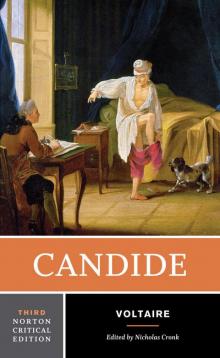 Candide
Candide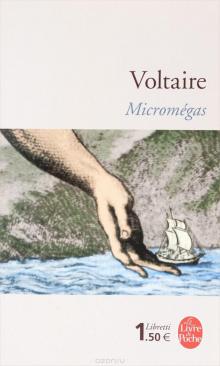 Micromegas
Micromegas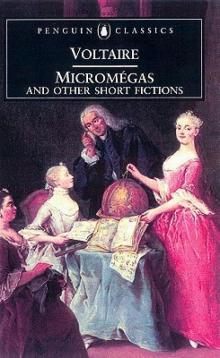 Micromegas and Other Short Fictions (Penguin ed.)
Micromegas and Other Short Fictions (Penguin ed.)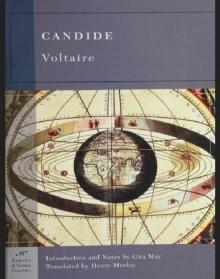 Candide (Barnes & Noble Classics Series)
Candide (Barnes & Noble Classics Series)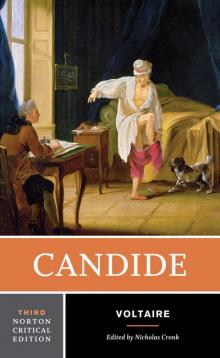 Candide (Third Edition) (Norton Critical Editions)
Candide (Third Edition) (Norton Critical Editions) Zadig or L'Ingenu
Zadig or L'Ingenu